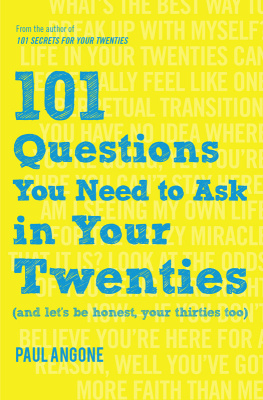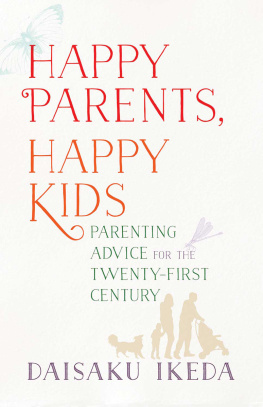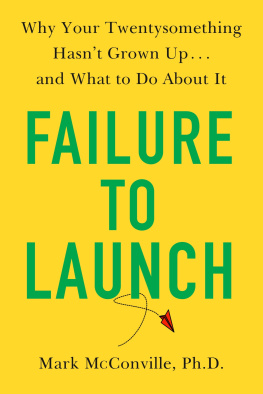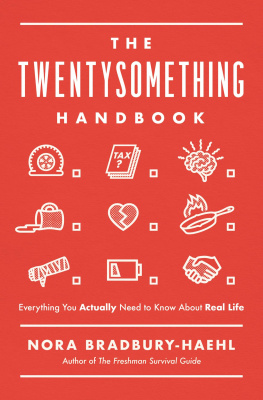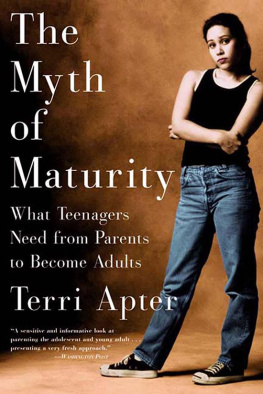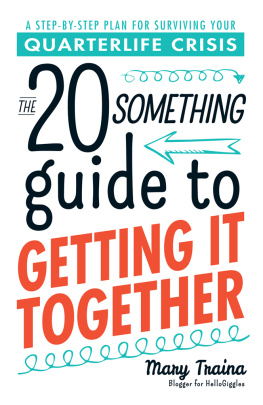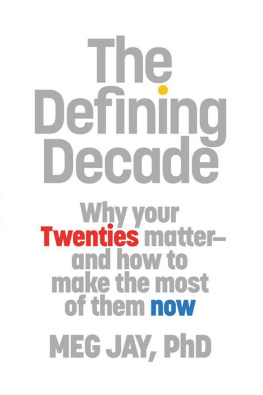HELP YOUR
TWENTY
SOMETHING
GET A LIFE...
AND GET IT NOW
{Other Books by Ross Campbell, M.D.}
How to Really Love Your Child
How to Really Love Your Teenager
How to Really Love Your Angry Child
Parenting Your Adult Child
(co-authored with Dr. Gary Chapman)
The Five Love Languages of Children
(co-authored with Dr. Gary Chapman)
How to Really Parent Your Child
How to Really Parent Your Teenager
HELP YOUR
TWENTY
SOMETHING
GET A LIFE...
AND GET IT NOW
DR. ROSS CAMPBELL
WITH ROB SUGGS

2007 Ross Campbell.
All rights reserved. No portion of this book may be reproduced, stored in a retrieval system, or transmitted in any form or by any meanselectronic, mechanical, photocopy, recording, or any otherexcept for brief quotations in printed reviews, without the prior permission of the publisher.
Published in Nashville, Tennessee, by Thomas Nelson, Inc.
Thomas Nelson, Inc. books may be purchased in bulk for educational, business, fund-raising, or sales promotional use. For information, please e-mail SpecialMarkets@ThomasNelson.com.
Scripture quotations are from the HOLY BIBLE, NEW INTERNATIONAL VERSION. Copyright 1973, 1978, 1984 by International Bible Society. Used by permission of Zondervan Bible Publishers. All rights reserved
Library of Congress Cataloging-in-Publication Data
Campbell, Ross.
Help your twenty-something get a life -- and get it now / Ross Campbell with Rob Suggs.
p. cm.
Includes bibliographical references.
ISBN 10: 0-8499-4543-7
ISBN 13: 978-0-8499-4543-4
1. Parent and adult child. 2. Parenting. I. Suggs, Rob. II. Title.
HQ755.86.C352 2007
306.874--dc22
2006038460
Printed in the United States of America
07 08 09 10 11 RRD 7 6 5 4 3 2 1
{contents}
All of us who have adult children want to see them suc ceed. The problem is our idea of success and our childrens ideas may be very different. They may see our efforts to help them as intrusion into their lives. Thus, conflicts arise which often lead to harsh words and broken relationships. Through my years of counseling, I have encountered numerous parents who are estranged from their young adult children, hoping that someday they will be reconciled.
The powerful message of this book is that broken relationships need not occur if parents can learn how to effectively parent their adult children. We are parents forever. The question is, Will we be effective or ineffective in our parenting?
None of us is a perfect parent. Therefore, one of the steps in effective parenting is to admit our own past failures and request forgiveness from our adult children. Such honesty can clear away the rubble and allow the potential for building a more positive relationship in the future.
Successfully relating to your young adult child does not come without effort. It requires genuine empathetic listening with a view to understanding your childs perspective. It involves accepting and loving your child even when you disagree with their ideas. When the young adult feels loved and respected, they are far more open to parental influence.
We cannot control the behavior of our young adult children but we can positively influence them. They can profit greatly from our wisdom. The question is how do we communicate our wisdom in such a way that it will be received and appreciated rather than rejected? Dr. Campbell has worked as a psychiatrist for over thirty years and knows the skills of interpersonal relationships. To the parent who is seeking help, this book is a treasure chest full of wisdom. I highly recommend it to all parents of young adult children.
Gary D. Chapman, Ph.D.
Author of The Five Love Languages
{one}
A GENERATIONAL PROFILE
Since youve picked up this book , presumably you have a son or daughter in the twenty-something age-group. And presumably what you want most is to help your adult child get moving in a positive direction in life.
Be encouragedthere are plenty of good strategies for parents to take. The very first strategy is to seek a clear understanding of the situation at hand. Most modern parents understand they are facing an entirely new world with new conditions, because they themselves were part of a generation that changed the world (called the baby boomers, the name generally assigned to the group born between 1945 and 1964). These parents arent demanding that their children do things exactly as their parents or grandparents did; they simply want their children to do something. It sometimes seems to Mom and Dad as if the lives of their children are stuck in neutral. Why is this the case for so many young people of this age-group? And what can we do to help them?
To start with, we can learn as much as we can about the world of our adult children. What forces from within motivate them? What forces from without?
Many people call them twenty-somethings. Author Elina Furman calls them the Boomerang Nation, because we hurl them out into the world, and they come soaring back. They have also been called the iGeneration (for Internet and particularly for that age-group staple, the iPod); the MTV Generation; Twixters (a term to describe being stuck between adolescence and maturity); and Generation Y (which means nothing other than being the follow-up act to their older siblings in Generation X).
No contemporary condition could approach the influence you have had by simply raising your child for the first two decades of his life.
Perhaps a good start would be to drop all the cute labels and attempt to see our children in a way that is more meaningful and less superficial. This generation is more than the sum of its influences, whether the Internet or MTV. Generational groupings in themselves are more helpful as media shorthand than as true descriptions of living, thinking human beings. Sure, to some extent your child is a product of 9/11 and the Internet, but in a much more profound and significant way, your child is genetically, spiritually, and emotionally a product of the home you have worked to maintain. No contemporary condition could approach the influence you have had by simply raising your child for the first two decades of his life. Thats helpful to remember next time you begin to wonder if your offspring is an alien life-form of some kind!
Having said that, we can make some general observations about that group of young adults who are now in their twenties. What follows are a few of the hallmarks that help to define (at least for some observers) a distinct generation.
Perhaps the most significant issue facing twenty-somethings and their parents is todays economic climate. A number of factors have conspired to create an atmosphere unlike any previously faced by young adults.
Twenty-somethings of the 1930s faced our nations greatest financial collapsea time when jobs were hard enough to come by. What makes the contemporary situation unique is actually more about expectations. That is, the parents of todays young adults have experienced unprecedented prosperity. They enjoyed the postwar boom of the late twentieth century and flourished. Some have speculated that today we have the first generation to face less prosperity than the one preceding it.
Think of it this way. The baby boomers are defined, more than any other factor, by their sheer numbers. During those years between 1946 and 1964, there was an unprecedented spike in the birth rate. Together these children came of age and entered the job marketand cornered it. Baby boomers dominate the workforce today, though many of them are finally reaching retirement age. As a result, young adults of the last decade or so have struggled to find their place
Next page



